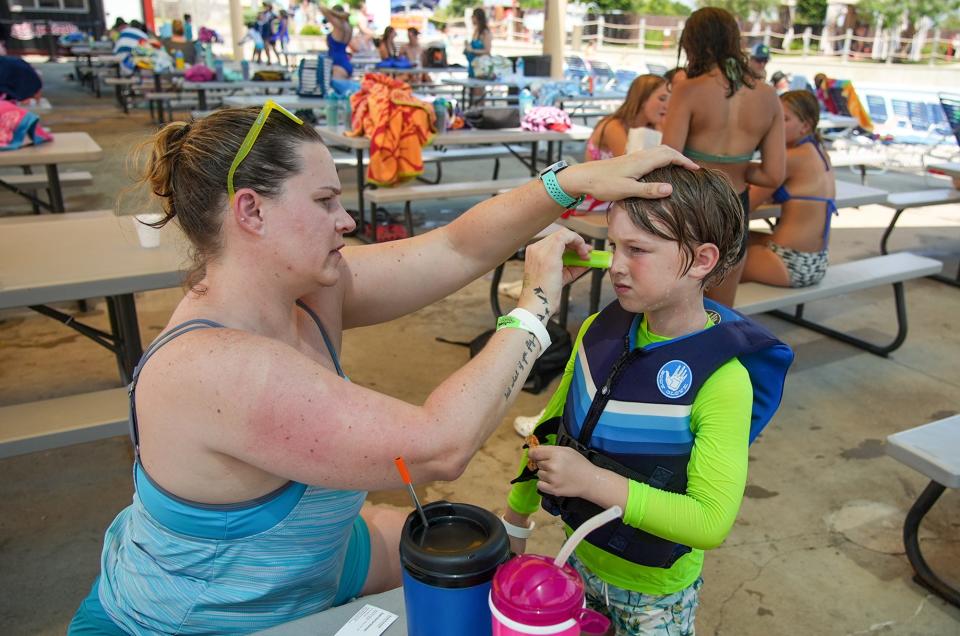Can medications make this Texas heat worse for my body?
The intense summer heat and sun has arrived. The National Weather Service predicts Central Texas will see highs in the lower 100s all week. And that means we should check our medications for any side effects to the heat.
We all should be loading up on sunscreen, wearing sun-protective clothing, staying indoors during the heat of the day and drinking plenty of water, but people who take certain medications can be at more risk for dehydration, sun burns, heat rashes and heat-related illness, said pharmacist Jodie Pepin, clinical pharmacy program director for Austin-based Harbor Health.
If you read the handouts that come with prescription medications, the description of side effects should say if that medication could cause photosensitivity (sun sensitivity), heat sensitivity or dehydration. The bottles also should have stickers on them indicating these warnings as well, Pepin said, but often people don't think about it unless someone points it out, or they have had a bad sunburn, heat exhaustion or heat rash.
The list of these dehydrating, sun-sensitive and heat-sensitive medications includes many common medications for high blood pressure, diabetes, allergies and pain relief.
More: Is the Texas power grid ready for the summer heat? Here's what experts predict

Which medicines can increase dehydration?
Becoming dehydrated can cause problems with blood pressure, heart rate and regulating the body temperature. Extreme cases can cause brain damage and kidney damage.
Signs include confusion, inability to urinate or dark urine, fatigue, headache and dizziness.
People taking these medications need to drink more water than an average person, especially during summer:
Diuretics (hydrochlorothiazide, chlorothiazide, furosemide, bumetanide, torsemide). These medications are designed to get rid of fluids in the body and are often prescribed for people in heart failure. Sometimes diuretics are added to high blood pressure medication. If your medication has HCTZ after it, it is the high blood pressure medicine along with the diuretic hydrochlorothiazide.
Laxatives of any kind. These cause you to lose water through your stool. If you haven't had a chance to replenish after taking laxatives, your electrolyte balance and the amount of fluid in the body won't be correct, Pepin said.
SGLT2 inhibitors for diabetes (dapagliflozin, empagliflozin, canagliflozin). This newer class of medications for people with diabetes also helps in heart failure, Pepin said. Because of the way these medications work, they are dehydrating.
Be heat aware: Use hydration, common sense to protect yourself from Central Texas heat

Which medicines can make you more sensitive to heat?
Some medications cause the body to not sweat or reduce the blood flow to the skin, which reduces the amount of sweat. Even though people don't like to sweat, Pepin said, sweating is necessary for the body to cool itself.
Stay inside during the heat of the day or stay in the shade if you are taking these medications:
Beta-blockers (metoprolol, atenolol, nebivolol, propranolol, nadolol). These are used for controlling high blood pressure and don't allow the vascular system to dilate, which is needed to cool you off.
Decongestants (pseudoephedrine, phenylephrine). Used for a head cold or allergies, these restrict your blood flow, which reduces the blood flow to your skin to cool down your body.
Adderall and other stimulants. The medications for controlling attention deficit disorder also reduce your ability to sweat.

Which medicines can make you more sensitive to the sun?
Some medications make you more likely to get a sunburn or heat rash. Sometimes it's not clear why these medications cause the reaction, Pepin said, but when these medications were studied, that side effect was noted.
Antibiotics (tetracycline, doxycycline, levofloxacin, ciprofloxacin, sulfonamides).
Diabetes medications that are sulfonylureas (glyburide and glipizide).
Statins (simvastatin, atorvastatin, pravastatin). These lower cholesterol.
NSAIDS (ibuprofen, naproxen, celecoxib). These are pain relievers commonly known as Advil, Aleve and prescription Celebrex.
Antihistamines (diphenhydramine, cetirizine, loratadine, cyproheptadine, promethazine). These are your over-the-counter standard Benadryl, Zyrtec and Claritin for allergies as well as some less well-known antihistamines.
St. John’s wort and vitamin B6. St. John's wort is used for depression and menopause symptoms. B6 is used to supplement when there's a deficiency in the vitamin as well as for some anemia, and nausea during pregnancy.
More specialized medication such as chemotherapies. Each one is different. Ask your doctor if yours has any side effects such as light sensitivity.
The latest weather: Storm chance for Austin to diminish during the week. It'll be hot, into the 100s
This article originally appeared on Austin American-Statesman: Allergy medicines, other medications can have side effects in heat

